Fun Ranking*
The 13 most fun golf courses in the U.S., according to our expert
It's a golf question for the ages. What makes a golf course fun?
There are probably as many answers as there are golfers. After all, fun is in the belly laugh of the beholder. I recall a round years ago on a nine-hole course with sand greens in central Kansas where I watched a threesome of overgrown farm boys, each in overalls, tee off. Then one picked up all three golf bags in a bundle while the other two gripped the handle on each end of a large aluminum cooler full of iced beer and trudged down the fairway. They were having fun on their home course, even though the temperature was pushing 100. I was having fun, too, by running Stimpmeter readings on the sand greens as I played. Twelve rolls per green, the average Stimpmeter reading less than three feet of roll. Most golfers would call those greens No Fun. The farm boys would beg to differ.
Golf Digest has made various attempts to identify fun golf courses, as if some common thread could be gleaned. We once polled panelists for their fun favorites. The top three were Cypress Point, Fishers Island and National Golf Links. There were common threads, of course: panoramic scenery along the surf, golf’s most precious real estate, exclusivity.
We asked Golf Digest’s course-ranking panelists what factors they used to determine what's fun. I most liked the response offered by Bill Pollak, a longtime sports agent: "How well does the course encourage you to return?" While that implies a certain hospitality in the club operation, I think its main focus is on the architecture of the course. If the design is friendly to your game, pleasant to the eye, enjoyable in its presentation and satisfying overall, you're going to return to it again and again. Because it's fun.”
With that definition in mind, I've scoured my memory for courses that I've considered fun primarily because of their architecture. This list includes only public-access courses—which means checking off each course is a realistic pursuit for anyone. I hope everybody gets to play them, so you can experience the sort of joy that I've felt.
We urge you to click through to each individual course page for bonus photography, drone footage and reviews from our course panelists. Plus, you can now leave your own ratings and reviews of the courses you’ve played. Which courses get your vote for being the most fun? Search for your favorites here.

An admittedly self-serving entry, as I assisted Stephen Kay on the design of this course, but the premise is what makes it fun to play. It's 18 holes in the style of 18 old dead architects, presented chronologically from Old Tom Morris to Robert Trent Jones. The idea is that customers might absorb some appreciation for different architectural styles without feeling force-fed. The low-profile crosshazard on the Dev Emmet fourth versus the chocolate-drop-mound-laden Walter Travis fifth, for instance. Now 22 years old, Architects' different bunker styles have become a bit homogenized through standardized maintenance practices, but the individuality of each hole is still recognizable and memorable. This was a fun golf course to build with the intend of being a fun one to play.

The Omni Bedford Springs Resort is the Yankee version of The Greenbrier in West Virginia, with a massive 19th-century hotel overlooking nine holes by A.W. Tillinghast and nine by Donald Ross, rescued and improved by the veteran team of Ron Forse and Jim Nagle. They reclaimed one of Ross’s boldest par 3s, the 225-yard uphill fourth, dubbed “Volcano” because of the hilltop location of its green, and also recaptured the spirit of Tillinghast’s 1916 pitch-shot par 3, “Tiny Tim,” played over marsh and pond to a tricky green ringed by knobs and bunkers. Every hole at Bedford Springs is quirky and delightful, even the final two fashioned from the previous driving range. The par-3 17th is a Redan without the runaway green, and the short S-shaped par-4 18th mixes Tilly and Ross, with challenge bunkers, cross bunkers and an elevated, canted green.
You can find my full review of the Old Course at Bedford Springs here.
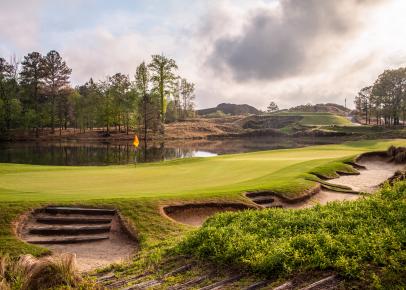
The artistry of the late Mike Strantz is probably presented in more playable form at his tandem Myrtle Beach masterpieces, Caledonia and True Blue, but my preference is for his Tobacco Road design. While it's just down the street from Pinehurst, it's a different planet. Pinehurst is horse-drawn carriages, Tobacco Road is motocross. Pinehurst is Monet, Tobacco Road is graffiti. Pinehurst is horseshoes, Tobacco Road is hand grenades. Features seem distorted. Bunkers are craters, greens are mushrooms the width of football fields surrounding by eroded ski slopes of sand. Yes, there are 13 blind shots among the 18 holes, which forces me to use my imagination, to visualize shots and place my faith in both my swing and Mike Strantz. But there are oodles of sideways room out there, obscured by trees, dunes, horizons and countless cabbage patches. These days, Tobacco Road is beyond my meager golfing skills, but I cherish it. As a golfer, I need a dose of tough love from time to time.
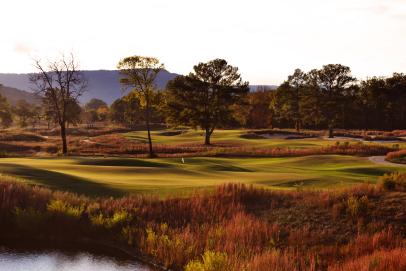
Sweetens Cove is an indirect descendent of Tobacco Road with its enormous fairways, massive greens and head-shaking bunkers. The first work of the now popular design team of Rob Collins and Tad King, it was a total makeover of a forgettable nine-holer called Sequatchie Valley. I'm infatuated with it mainly because it fits my long-held philosophy that if you're going to build a stand-alone nine-hole course, every hole needs to be an in-your-face thriller if you want to get repeat play. That is clearly the case, based on its increasing popularity and the praise of the King-Collins design tandem. There's not an ordinary hole among Sweetens’ nine, not even an ordinary shot. Every time I've played it, I eagerly took in a second loop, and once I even went a third time around. Which was fitting, because there seems to be at least three ways to play each of its cleverly-crafted holes.

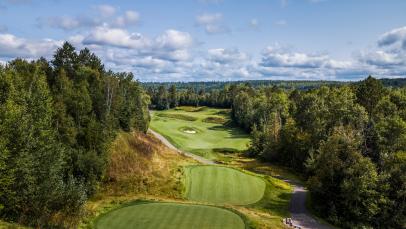
The Quarry has always been a personal favorite. Golf Digest panelists voted it the Best New Upscale Public Course of 2004. Dusting off an old issue, I recently reread my description. I can't improve upon it, so I'll just quote it: " Jeff Brauer's design is the embodiment of diverse shot values of every size, shape and configuration, from slender corridor to triple-size fairway, from sly dip to sinister green plunge, from subtle slope to severe bankboards. Others have practiced play-it-over-there-to-end-up-here architecture, but few have accomplished it in quite such a compelling and captivating style. By slanting and canting targets areas and incorporating speed slots, domes and punchbowls, Brauer reminds us that golf is still a game of shotmaking, if not achieved by curving a ball through the air anymore, then certainly by bouncing, deflecting and diverting it on the ground."

There is always fun in discovery, and Monarch Dunes is one of those destinations I readily recommend even though it's residential development golf. It's north of Santa Barbara but not quite to San Luis Obispo, it rests on Pacific sand dunes, which is reflected in the design by Damian Pascuzzo and Steve Pate (a PGA Tour veteran). I've never seen anything quite like it, rolling tumbling terrain lined with enormous eucalyptus trees, each fairway edged and bisected by random dunes with steep edges, The perimeter of each hole is raw sand, the result of recent turf reduction measures to address California's extended drought, I also recommend its 12-hole par-3 Challenge course. Play it as I did, from the forward tees with left-handed clubs to the larger of the dual cups in each green. I felt like a kid again, a kid just learning to play golf.
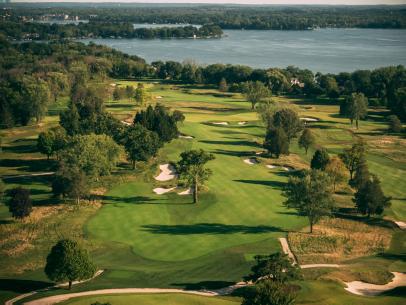
In the state containing Blackwolf Run, Whistling Straits, Sand Valley, Lawsonia Links and Erin Hills, I pick Lac La Belle? Absolutely, and you should, too, if fun is your primary goal. Wild putting surfaces are the dominant feature here, with contours that sometimes come within a razor's width of being goofy but never become unfair. The club dates to the 19th Century but the course and its greens were built in 2020 by Craig Haltom, a golf contractor-turned-designer best known as being the guy who discovered the Sand Valley site and convinced the Keiser family to develop it. Haltom's work at Lac La Belle must be seen and putted to be believed. Commanding your full attention on both approach shots and putts, it has some of the most startling, dramatic and fun greens found anywhere.
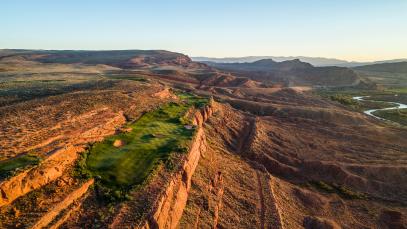
In a region of gorgeous national parks, Sand Hollow is akin to one, a collection of Loyal Chapman calendar art fantasy holes come to life. The front nine is scenic, each fairway an avenue of moguls framed by sagebrush desert, with bunkers the color of red clay. Starting at the par-3 11th, Sand Hollow takes us to the edge of earth and back, with four consecutive holes that march perilously along a rock ledge nearly 200 feet above a canyon floor. Each hole is a cliffhanger, with views of a red rock valley some 30 miles wide and, in the far distance, a collection of mountains called the Pine Valley Range. Sand Hollow also has a rustic third nine, The Links nine, with tallgrass rough instead of desert, shaggier bunkers, and firm conditions intended to reward our ground game. The day I played, a jackrabbit, a squirrel and a gekko scrambled across as I approached one green.
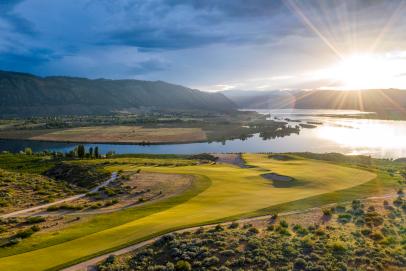
David McLay Kidd considered his design at Gamble Sands to be penance for all the super-hard layouts he had constructed during the first 15 years of his career, projects like The Castle Course at St. Andrews, Scotland and Tetherow in Oregon. At Gamble Sands, Kidd welcomes us with open arms and open fairways, 60, 80 even 100 yards wide. Both fairways and greens are the same fescue given the same amount of water, so there are ample opportunities to putt from 50 yards or more off the collar. There's no conventional rough, just desert cleaned of vegetation so errant shots can be found and played. “I wanted to put the idea of fun back into the game,” Kidd said when Gamble Sands opened in 2014. He has since followed up with other playable designs of similar massive scale, particularly Mammoth Dunes at Sand Valley in Wisconsin. That one is fun, too, but I prefer his penance.
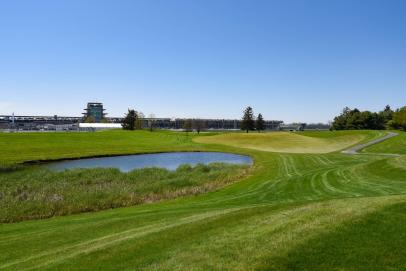
As an unapologetic Pete Dye fan, I know the most economical way to understand and appreciate Dye's genius is to simply play Brickyard Crossing, the course associated with the Indianapolis Speedway. There are four holes on the infield of the race track that provide a complete portfolio of his evolving design style. The par-3 seventh plays to a massive Seth Raynor-styled green perched some 10 feet high. The par-4 eighth is a boomerang par 4 along a lake that brings to mind the eighth at Crooked Stick, with a long rippled green a salute to Alister MacKenzie. The par-4 ninth is peppered with 10 pot bunkers in the right rough, eight more in the left. The short par-4 tenth, a dogleg wrapped around a long flat waste bunker down the left side, is a hole is full of Dye illusions. None of the four holes look or play anything like the other three, which makes it not only challenging but fun as you analyze and conquer. Plus, it's in the middle of the Indianapolis Speedway racetrack.
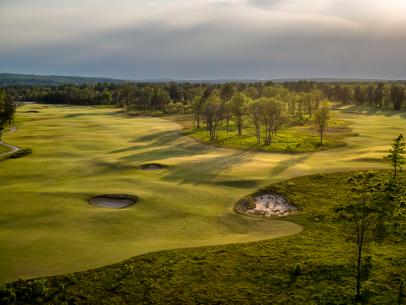
This may be Tom Doak's most brilliant design, with 18 reversible holes played clockwise one day and counterclockwise the next. Never once will you feel like you're playing a hole backwards. The trick, I think, was that Tom didn't use huge double greens or double-wide fairways like those found at the Old Course at St. Andrews (grandpappy of the reversible course concept.) He built normal-sized fairways and greens, and routed the course so opposing approaches into a single green are never from the exact opposite side. One day you might hit into a green that slopes left to right and the next day hit into the same green from an angle where the green is running away from you. You never recognize a green you played the previous day unless you really study it. You're more likely to recognize a particular bunker. It is an absolutely fascinating design, a wonderfully enjoyable game of discovery and recognition.
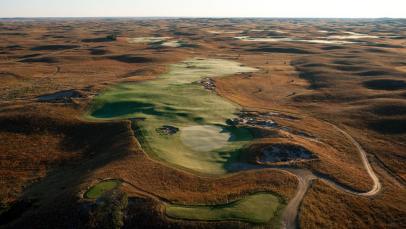
The one genuine Nebraska sandhills golf experience open to all is The Prairie Club, with 46 holes. Its Dunes Course is a full 18 among sandhills peaks and valleys, with native sand bunkers, yucca plants, barbed wire fences and prairie gales that make you appreciate the generously wide fairways. Its Pines Course has nine holes woven through the dunes but starts and finishes along the rim of the pine-lined Snake River canyon, a sliver of Colorado transplanted to the Cornhusker state. For pure fun, maybe the best of all is the Horse Course, a pitch & putt with 10 greens but no formal tees, just an expanse of tightly-mown dips and rolls. It's meant to be played like the basketball game of Horse. Win a hole, call the next shot: From this bunker over that bunker to that far pin; or down this bank, to that green, using putter only. It allows us to not only be trick shot artists, but golf architects as well. How fun is that?
• • •
Explore Golf Digest's recently relaunched Places to Play community, where you can add star ratings and reviews for all the courses you play. We've collected tens of thousands of reviews from our course-ranking panelists to deliver a premium experience, which includes experts' opinions, bonus course photography and videos, plus much more. Check it out here!


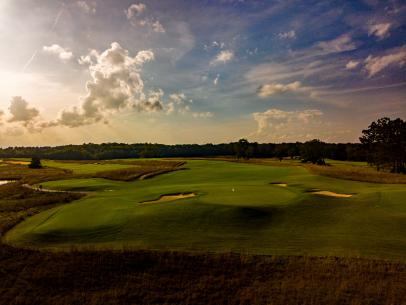
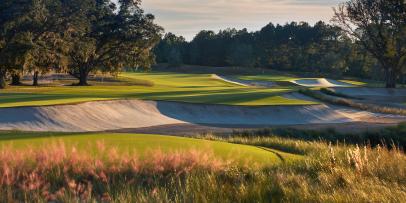
.jpg.rend.hgtvcom.406.271.suffix/1653909255033.jpeg)